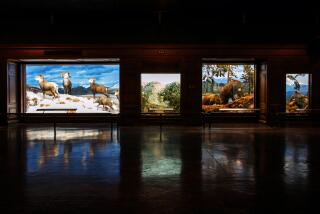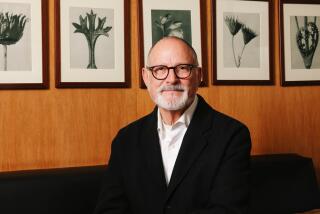The perpetual paradoxes of life
Discussing the genesis of his recent project, “Migration,” which has its West Coast debut at Regen Projects this month, Doug Aitken tells the story of a conversation he had in Las Vegas with funk musician George Clinton.
“He was staying at a Days Inn,” Aitken recounts, “but he was playing at some really fancy casino. So I said to him, ‘Why aren’t you staying at the casino? I’m sure they would have given you a penthouse or something.’ And he said” -- here Aitken slips into a low, world-weary, rock star voice -- “ ‘Yeah, you know, I’ve been on the road since, like, 1968 and I’ve been staying at the Days Inn since 1968, and all I want to do is fall asleep and wake up in the exact same place.’ ”
It is a curious image -- the godfather of funk, with his mop of multicolored dreds, padding about a cheap motel room -- and not far removed from what “Migration” became: a 24-minute film involving a succession of such motel rooms, each occupied by some variety of wild animal. The creatures, all indigenous to North America, appear alone or in pairs, doing, in most cases, whatever they set about doing when Aitken and his crew let them loose. A buffalo overturns furniture with the nudge of its massive head; a mountain lion tears into a bedspread; a beaver plods across a tile floor and angles its face beneath the faucet in a bathtub. (Shot on location across the country, the film presented an unusual array of logistical challenges -- “I think there were a few hotels that thought we were making adult films or something,” Aitken says -- but there were, surprisingly, no disasters.)
Filmed in the smooth, sleek visual style that’s become Aitken’s signature and backed by a lush soundtrack, the piece has the air of a surreal travelogue, sincere though not especially sentimental, its pathos held in check by the consummate strangeness of the spectacle it presents. The animals bring what feels like an ancient quality of consciousness to bear on a garishly contemporary setting, illuminating the chasm between the two.
The piece premiered at last year’s Carnegie International in Pittsburgh. It appears at Regen Projects in a reedited version, in two alternating formats: inside by day, on a billboard-like structure that’s been constructed in the gallery’s Almont Drive space; and outside by night -- “like a kind of insomnia,” as he puts it -- across the facade of its Santa Monica Boulevard location. It will be Aitken’s first public project in his hometown of Los Angeles (he was born in Redondo Beach), after a series of increasingly ambitious outdoor installations elsewhere -- most famously his 2007 piece “Sleepwalkers,” which projected interrelated narratives across exterior walls of the Museum of Modern Art.
At 41, Aitken has reached a heady phase in an auspicious career, with numerous large-scale projects underway around the world and a critical mass of institutional favor, from museums, foundations and collectors, of the sort that allows an artist to think big. He works not only in film and video, but also in photography, sculpture, architectural installation and performance.
Speaking in his Venice studio, a stylishly appointed compound with the studious air of an architecture firm, his manner is more schoolboy than art star. Having recently returned to L.A. after a decade of living in New York, he says he likes the thought of “Migration” also moving westward, along a path roughly mirroring the geographical trajectory of the piece itself. The first in a projected trilogy titled “Empire,” it is an exploration not only of the Western landscape but also of the idea of the West, of the frontier and all its psychological ramifications.
“We’ve exhausted the frontier in terms of geography,” he says. “It’s not even something that’s technological anymore. With technology, it’s like, OK, we can do it and it will be done, and if it’s not done now it will be done eventually. Whether it’s programming or code or anything -- it doesn’t really matter and it’s not very interesting to me. I’m interested in people, in how people occupy space and how they negotiate what they do and why.”
What struck Aitken about Clinton’s story is the peculiar confluence of novelty and sameness. The individual crosses great stretches of geographical distance, from city to city, country to country, only to land in precisely the same place -- it is the narrative of our time, in many ways, an experience of dislocation we’re all familiar with, whether the end point is a motel room, a fast food restaurant or a suburban home. What “Migration” speaks to is “this 21st century world that’s created out of repetition, where repetition can speed up to create uniqueness, or create another form of individuality, or another window into landscape.”
It is the sort of perceptual paradox that Aitken’s work has long zeroed in on. In such early projects as “Electric Earth,” from 1999 -- a labyrinthine eight-channel video installation that tracks the journey of a lone protagonist through a seemingly abandoned city -- his investigations involved, in his words, “pushing the architecture of film in some way,” creating “restless films” that stretched across multiple planes and refused linear viewing. In recent projects, he’s turned that dynamic inside out, creating films (or videos) that drape and, in some sense, become the architecture.
In several current and upcoming projects, he’s engaging architectural space. He’s building a pavilion in the forests of Brazil that sits over a hole dug one mile into the Earth and amplifies the sounds recorded at that depth. He’s attempting to make a building “disappear” from a sculpture park in upstate New York by projecting on its walls footage of its location prior to construction. And he’s trying to figure out how to manufacture a cloud from suspended water particles.
He refers to his projects as “experiments,” and the designation seems ever more apt: He’s playing with the fabric of time and space, prodding the instruments of human perception for weak spots, fissures and gaps.
“We experience life as a series of shards of time that expand and contract,” he says. “Certain memories and experiences have a longer time code; other ones we just kind of fast-forward because they mean nothing to us right now. I get frustrated sometimes when I see things put into such a rigid structure, with a beginning and an end and a sense of closure. I think it just kind of denies the mystery of living.”
--
Doug Aitken: ‘Migration’
Where: Regen Projects,
633 N. Almont Drive, Los Angeles
When: Saturday to Oct. 14
Contact: (310) 276-5424;
www.regenprojects.com
More to Read
The biggest entertainment stories
Get our big stories about Hollywood, film, television, music, arts, culture and more right in your inbox as soon as they publish.
You may occasionally receive promotional content from the Los Angeles Times.










